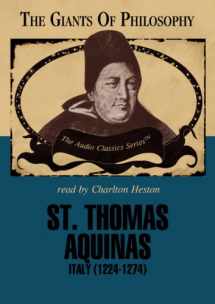
St. Thomas Aquinas: Italy (1224-1274) (Audio Classics: The Giants of Philosophy)
ISBN-13:
9780786169320
ISBN-10:
078616932X
Edition:
Unabridged
Author:
Kenneth L. Schmitz, Centennial Professor of Philosophy John Lachs PH.D, Mike Hassell
Publication date:
2006
Publisher:
Blackstone Audiobooks
Format:
Audio CD
2 pages
FREE US shipping
Book details
ISBN-13:
9780786169320
ISBN-10:
078616932X
Edition:
Unabridged
Author:
Kenneth L. Schmitz, Centennial Professor of Philosophy John Lachs PH.D, Mike Hassell
Publication date:
2006
Publisher:
Blackstone Audiobooks
Format:
Audio CD
2 pages
Summary
St. Thomas Aquinas: Italy (1224-1274) (Audio Classics: The Giants of Philosophy) (ISBN-13: 9780786169320 and ISBN-10: 078616932X), written by authors
Kenneth L. Schmitz, Centennial Professor of Philosophy John Lachs PH.D, Mike Hassell, was published by Blackstone Audiobooks in 2006.
With an overall rating of 3.7 stars, it's a notable title among other
books. You can easily purchase or rent St. Thomas Aquinas: Italy (1224-1274) (Audio Classics: The Giants of Philosophy) (Audio CD) from BooksRun,
along with many other new and used
books
and textbooks.
And, if you're looking to sell your copy, our current buyback offer is $0.34.
Description
St. Thomas Aquinas is known for producing history’s most complete system of Christian philosophy. In the late 13th century, this quiet, reflective Dominican scholar combined the work of Aristotle with Christian, Jewish, Muslim, and pagan thought to reconcile reason and faith. For Thomas, intellectual knowledge is a sign of the spirituality that energizes the human center. He believed we can know that God exists, but not what god is like. Thomas's masterpiece, the Summa Theologiae, contains over 10,000 objections and replies to fundamental questions about God and the world. It includes Thomas's famous "five ways" to prove God's existence, which are (1) the unmoved mover, (2) the uncaused cause, (3) the necessary being, (4) the perfect Goodness, and (5) the guiding intelligence. His thought continues to influence Catholic philosophy today.


We would LOVE it if you could help us and other readers by reviewing the book
Book review

Congratulations! We have received your book review.
{user}
{createdAt}
by {truncated_author}


